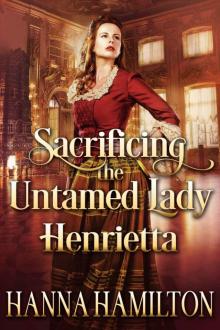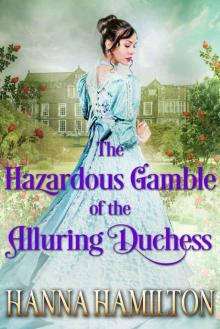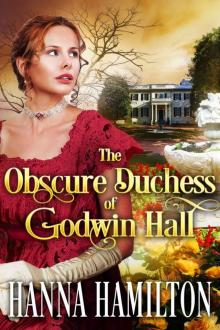- Home
- Hamilton, Hanna
The Obscure Duchess of Godwin Hall: A Historical Regency Romance Novel Page 13
The Obscure Duchess of Godwin Hall: A Historical Regency Romance Novel Read online
Page 13
Ought she go downstairs, and find out where the rest of the household was? Their host was dead, so to whom ought she speak and find out what was happening? Moreover, was it possible that anyone might actually know?
Still doing her best to rub the sleep feeling from her eyes, still doing her best to convince herself that it was not a dream, she went out of the sitting room and into the hall. The gallery was quite silent, and she could not see a soul.
She saw that someone had taken care to light the candelabras that lined the gallery, and for a moment she wondered whether the whole business had been real at all. Surely if the master were dead, then the whole household would have ground to a halt. Surely no one would have thought to light the candelabras.
Then she walked past Charles’ room and saw that the door still stood open.
While she had been asleep, Charles had been laid out upon the bed. He was wearing the black morning suit and tie that had characterized his mourning for his father, and now characterized a new kind of mourning. Candles were laid out at his feet, and someone had brought in some of the lilies from the hothouse; they filled the air with their scent.
Grandmamma Horatia was sitting at Charles’ side, dressed in full mourning. The candlelight lit up her face and gave it the look of an ancient statue.
She seemed lost in thought. Rebecca did not think that she had made any sound as she stood in the doorway, but all of a sudden Grandmamma Horatia’s head snapped around as if she had been abruptly disturbed.
She relaxed when she saw that it was Rebecca.
“Oh. My dear.” She gave a ghost of her familiar, courtly smile, and held out her hand. Then all of a sudden, her face started to crumple away like a piece of old parchment.
“Oh, my dear Rebecca, how shall I bear it?”
“I am so sorry, Grandmamma Horatia,” Rebecca said. She had always addressed the Godwin boys’ grandmamma as if she were her own and now did not seem like the moment to change that habit. “I am more distressed than I can possibly say.”
“It is just that I have experienced such a great many losses,” Grandmamma Horatia continued, dabbing at her eyes with a handkerchief edged in black lace. “I never expected that I should find myself burying my own grandson.”
Rebecca continued to stare at the black handkerchief, and her heart ached for the old lady. It was clear from looking at her at that moment that she had worn her mourning garb more times in her life than anyone should have to.
She reached out and placed a hand on the soft black crepe of Grandmamma Horatia’s sleeve.
“I wish for you to know, my dear, categorically and unambiguously, that I do not believe a word of what Charles said to you,” Grandmamma Horatia said. The words seemed to come out of nowhere, and their power appeared to echo about the room and struck Rebecca straight in the heart.
The truth was that in the mire of sleep, in the strangeness and sorrow and confusion, she had forgotten the content of the last words that Charles had said to her. Now at once, it all came flooding back, and she realized the enormity of it all.
Do I stand accused as a murderess?
“The doctor has examined Charles,” Grandmamma Horatia continued, her voice wavering a little. “He believes that there may have been a case of poisoning.”
Rebecca could not maintain her composure at this. She sat down in the chair beside Grandmamma Horatia’s, the blood draining away from her face as the impact of the words entered her mind.
“Poisoning? But how could that possibly be?”
“I hope and pray that it was a mere accident,” Grandmamma Horatia said. “Indeed, perhaps that is what shall be concluded. But for the time being, we simply do not know. All the doctor will say is that it would have been a very significant dose of poison if it were administered by accident.”
“Charles was poisoned,” Rebecca whispered, primarily to herself. She knew that at some time, if she said these words enough, then she would come to believe them. However, this time had certainly not arrived yet. “Charles believed that I poisoned him.”
“The doctor has gone to York to fetch a constable at my instruction,” Grandmamma Horatia continued. “I expect that he will have his own ideas of how he wishes to proceed.”
“The doctor will inform him that Charles believed I poisoned him,” Rebecca said, her voice threaded with fear and rather broken. “They will arrest me as a murderess.”
“They will do no such thing,” Grandmamma Horatia said, placing her hands, in their black lace gloves, on top of Rebecca’s. “For three reasons. Firstly, because I will vouch for you. I would not have asked the doctor to fetch a constable if I believed that you would be wrongfully accused. Secondly, because there is no evidence against you. And thirdly, and most importantly, because you are innocent.”
“Vouch for me?” Rebecca responded, in pure confusion. “Why should you vouch for me?”
“Because when we went out into the greenhouses earlier, you were still quite disconsolate,” Grandmamma Horatia said simply. “You still believed that you were going to be forced into marrying Charles.”
Rebecca looked up slowly, not quite understanding what Grandmamma Horatia meant to suggest.
“If you had been expecting Charles to die, if you had indeed poisoned him, you would not have been in such a state of terrible distress at the thought of your marriage,” Grandmamma Horatia concluded simply.
“I could see your naked misery in your eyes, my dear girl. It was not the expression of a woman who believed that she had managed to steal her liberty through murder.”
Rebecca nodded. She had been so disturbed and confused by the events of the last few days that in truth it had not even occurred to her to protest her innocence. Surely it was self-evident to everyone involved that she was not guilty, that she was not capable of doing such a thing to anyone, let alone to Charles.
The whole idea was so new and so foreign that she could have no way of thinking how seriously any authority might take the claim against her. Perhaps he would laugh it off and say that it was clearly a case of rat poison accidentally fallen into the pudding.
Perhaps he would point at her and declare her a murderess and clap her in chains and take her directly to Newgate to stand trial for murder.
Perhaps the next week’s papers would bear the headline, Lady Rebecca Winterson: Murderess!
She tried to stand up, thinking that she needed to take in some fresh air, but her knees seemed to give way at the slightest weight.
“Fawcett!” Grandmamma Horatia called into the hall, and one of the footmen came running, skirting the edge of the bed where Charles was laid out as if he feared that the corpse would do him some harm.
“Would you take Lady Rebecca out to the terrace, please? I believe that a few breaths of fresh air would do her a great deal of good.”
The manservant nodded and offered Rebecca his arm for support with such a show of kindly gentleness that for a moment Rebecca wanted to weep. Surely, this was not the gesture of a servant who believed that she had murdered his master.
“Oh, and I have sent an express to London,” Grandmamma Horatia called out behind them. “I believe that Andrew will come as soon as he receives the news. God willing, he will be with us by morning.”
Andrew…
Rebecca would have been ashamed to admit that her heart leapt at the mention of his name, but nonetheless, the truth was that it did. She knew that she should not look to his coming with any anticipation at a moment like this.
Moreover, she knew that there was every possibility that he would believe that she had been responsible for poisoning his brother. She would have found it hard to believe if Andrew claimed to believe her capable of such things.
But that would not have been the only thing that she found hard to believe on this terrible day.
She allowed Fawcett to support her out of the door and down the main staircase.
In the entrance hall, she found her father sitting in one of the plush velvet chairs at
the entrance. He was staring into space with the look of a man who was entirely distracted, who had lost all his bearings in the world.
“What is the meaning of this, Rebecca?” he asked. She had heard those words many times before from his lips, of course. But never before had she heard them spoken at a loss like this, with a tone of such pure disbelief and dismay.
She opened her mouth to say in reply, I do not know, Father, but curiously the words would not come. She settled for helplessly shaking her head and settled for allowing Fawcett to continue guiding her out of the house and into the night air.
“Thank you, Fawcett,” she managed to say. He stayed long enough to ensure that she was able to stand upright by herself, and then left with a bow and the words, “Please send for me if you should need me, my lady.”
Rebecca nodded and took a step or two into the night air.
She wondered if she would have been permitted to leave the house unaccompanied if anyone believed her to have murdered Charles. Perhaps, she thought a little wildly, Godwin Hall would have been surrounded, and men would be lying in wait for her in the hopes that she might make a mistake that they would be able to take as proof of her guilt.
Then she caught herself and reminded herself that just because she was capable of imagining some wild fancy, that certainly did not mean that it was true, nor was it useful to dwell on such things.
She took a deep breath and leaned on one of the stone balustrades of the pillar to take stock.
Only a day ago she had bid goodbye to Andrew, thinking that this parting was the worst of her troubles. Now, her fiancé was dead by poisoning.
The first thing that she pointed out to herself, the first thing that even she needed to remind herself of, was that she was entirely innocent of any wrongdoing.
That, although she might have wished Charles ill in her mind and sincerely desired the coming of any circumstance that might have spared her from marrying him, she had never wished a lot of harm to him. Indeed, that she had loved him all her life, albeit not in the way that he had wanted.
She had to remind herself of these things because her fear was causing her to doubt her own mind, and that would not do.
At this juncture, the best and most sensible action that she could take would be to remind herself that the matter would most likely be resolved and declared an accident. That there was no question that anyone in Godwin Hall had wished Charles dead, much less tried to enact harm on him.
Forgive me, Becca.
The words came back to her in a sudden rush, the remainder of ink on paper that had so struck her only that morning.
Forgive me, Becca. A.G.
At the time, she had scarcely given the content of the note as much thought as the fact that Andrew had written a private note to her at all. That was what had struck her, made her catch her breath and glow with the pleasure of a secret.
But what if his request for forgiveness had not been in about his departure? What if he had meant something different altogether?
Rebecca felt her heart beginning to thud in her chest like a funeral drum. Surely she could not believe such a terrible thing… of Andrew?
She decided that she was not even going to let herself entertain the notion. Andrew would never do such a thing. It went against all the integral aspects of his character — his sense of fundamental decency, his deeply moral core, his native kindness.
It was an insult to him to even consider it.
Rebecca turned away from the moon and stars above as if turning away from the very idea, and caught sight of Caroline standing at the French windows.
She appeared to have dressed for dinner, albeit very haphazardly. Her hair was done up but in a sort of disarray that suggested she had attempted it herself without the aid of a ladies’ maid. Her gown was not arranged correctly either, and the handsome pendant that she often wore for dinner occasions hung crookedly around her neck.
Caroline gestured at herself, saying in a quavering, subdued voice that was quite unlike her own, “I dressed for dinner. I did not know what to do. I did not know…”
Rebecca was confused at first by the sight of her friend but immediately sympathized with the clear sense of confusion and disassociation that her friend was feeling, for, of course, they all felt it.
“My dear Caroline,” she said, crossing the terrace to embrace her friend. “It is quite all right. You need not explain.” Caroline’s body seemed to stiffen at first. Clearly she had not been expecting the embrace and did not know what to make of it, but eventually, she relaxed and placed her arms around Rebecca too.
Rebecca stepped away and looked her friend in the eye, saying sadly, “None of us know what to do, nor how to behave. You are certainly not the only one.”
Caroline nodded. Her face was pale and drawn, much as Rebecca imagined her own face to be.
“I do not know what to make of it,” Caroline said, her voice quavering as if she might very soon lose her composure completely. “I never imagined that anything like this would happen.”
“How could you have?” Rebecca asked warmly, her own voice rising in relief that she had someone with whom she could express the depth of her disbelief. “It is unlike anything I have ever known in all my life.”
Caroline began to weep at that, and Rebecca realized with some horror that in all the furor and upset, it was very likely that no one had thought to attend to Caroline nor to ensure that she was all right.
“Caroline, I hope that…”
She was interrupted, however, by a noise at the end of the gravel drive. Both of the young ladies turned as one to see the lanterns of a carriage making their progress towards the house.
For a moment Rebecca’s heart made a sudden leap, thinking that it might be Andrew. Then she realized that with the distance to London that was utterly impossible, and her chest seemed to seize.
It was the parish constable. He had arrived to investigate what he clearly believed to be the murder of the Duke of Leinster.
Chapter 25
Mr. Alfred Langham had served in several public offices in his lifetime, and he had to admit that he was rather fond of them. His first endeavor in public life was as the mayor of a small town, then as an alderman in York.
He had not intended to take on another position, given that most of his offices thus far had not offered any remuneration. Instead, he had hoped to spend his later years ensuring that his four daughters made good matches and enjoying the perennial pleasures of ale and a good pipe.
However, when, as a householder, his turn had come to take the post of constable he had been secretly pleased. He enjoyed authority in every form.
Primarily his work consisted of ensuring that bridges were in good repair, that adequate provisions were made for the deserving poor, and that the undeserving poor did not malinger in the parish. He had seen a murder or two before — paupers killed each other in drunken brawls, with no investigation required.
However, he had never dealt with the murder of a member of the landed gentry before, much less of a duke. To boot, the doctor who had come to report the poisoning had informed Mr. Alfred Langham that the victim had, on his deathbed, accused his fiancée of committing the terrible deed.
It was the sort of a thrilling pastime for which Mr. Alfred Langham would have been prepared to forgo any number of pipes and glasses of ale.
His anticipation was only heightened when he caught his first glimpse of Godwin Hall, emerging from the surrounding woods with its many windows illuminated in the darkness.
"A splendid prospect, sir,” Rattings, his deputy, remarked as they drove up the sweeping driveway. “To my mind, there are likely any number of people in England, men or women, who might be prepared to commit murder to take possession of it. Wouldn’t you say so, sir?”
Mr. Alfred Langham nodded thoughtfully.
“What I do not understand,” he said, “and what must be discovered, is why the girl chose to kill her fiancée before he became her husband, thus taking aw
ay her legal right to inherit any of his assets?”
“I expect that will become much clearer when we meet the girl,” Rattings said.
“The lady,” Mr. Langham reminded him automatically. As constable, he felt strongly that it fell to him to preserve the distinctions of social ranking.
No one greeted their carriage as it rolled up toward the back entrance of the Hall. He was not surprised, that was probably to be expected given the terrible event that had occurred here only hours before.
He climbed down from the carriage himself, calling to the driver to assist him with his bag, and raised his walking stick to rap three times on the back door.
It was answered, after some delay, by a rather white-faced butler.

 Charity Falls for the Rejected Duke: A Historical Regency Romance Novel
Charity Falls for the Rejected Duke: A Historical Regency Romance Novel The Scandalous Deal of the Scarred Lady: A Historical Regency Romance Novel
The Scandalous Deal of the Scarred Lady: A Historical Regency Romance Novel The Defiant Governess of Rosenhill Manor: A Historical Regency Romance Novel
The Defiant Governess of Rosenhill Manor: A Historical Regency Romance Novel Sacrificing the Untamed Lady Henrietta: A Historical Regency Romance Novel
Sacrificing the Untamed Lady Henrietta: A Historical Regency Romance Novel The Beauty and the Earl: A Historical Regency Romance Novel
The Beauty and the Earl: A Historical Regency Romance Novel The Hazardous Gamble of the Alluring Duchess: A Historical Regency Romance Novel
The Hazardous Gamble of the Alluring Duchess: A Historical Regency Romance Novel The Obscure Duchess of Godwin Hall: A Historical Regency Romance Novel
The Obscure Duchess of Godwin Hall: A Historical Regency Romance Novel Diaries of a Heartbroken Duchess: A Historical Regency Romance Collection
Diaries of a Heartbroken Duchess: A Historical Regency Romance Collection Diana Adores the Puzzled Duke: A Historical Regency Romance Novel
Diana Adores the Puzzled Duke: A Historical Regency Romance Novel